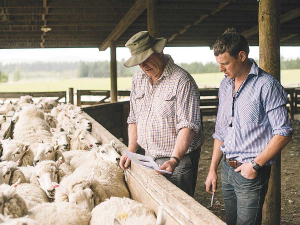NZ scientists make breakthrough in Facial Eczema research
A significant breakthrough in understanding facial eczema (FE) in livestock brings New Zealand closer to reducing the disease’s devastating impact on farmers, animals, and rural communities.
 Researchers found that the ability to cope with adversity, finding new ways of doing things and getting on with the job, were important in how the NZ agriculture sector performed so well during the pandemic. Photo Credit: Kieran Scott
Researchers found that the ability to cope with adversity, finding new ways of doing things and getting on with the job, were important in how the NZ agriculture sector performed so well during the pandemic. Photo Credit: Kieran Scott
A new report has found that Kiwi ingenuity and a drive to “make it work” were crucial to New Zealand’s primary sector managing the Covid-19 pandemic.
The study was carried out by AgResearch and the New Zealand Institute of Economic Research (NZIER) – along with several science research organisations in New Zealand and Australia.
Some 194 NZ farmers and workers from the agriculture and food systems sector were surveyed online – along with a further 127 Australian farmers and agriculture workers – about the impacts of Covid-19 during the period to June 2020.
Many respondents acknowledged overall negative effects, additional stress and pressure from the pandemic and response. The effects specifically mentioned include reductions in the availability of agricultural inputs and specialised and non-specialised labour. Also mentioned were distribution difficulties, reduced capacity in processing plants, and changes in market demand.
The report found that NZ’s agriculture industry began to feel the impact of the pandemic in late-February and early-March. It states that “the reduction in tourist arrivals substantially affected demand for agricultural products through the restaurant and fast food trade, both of which were shut down.”
Despite the difficulties faced by those in the primary sector, only 47% of New Zealand respondents viewed the effects on their farms or businesses negatively over the period studied. A further 37% said the effect was neutral.
Those interviewed in New Zealand said they also found positives coming out of the pandemic experience, such as opportunities for new markets for their products and increased community appreciation of their sector.
“The term resilience is a buzzword that’s probably a bit overused,” says AgResearch senior scientist Dr Val Snow.
“But it’s clear from our analysis that the in-built ability to cope with adversity through various means, find new ways of doing things and get on with the job, were important in how farmers and their supporting industries performed so well.”
Snow says that while many farmers were already dealing with drought conditions, they were able to manage through the extra difficulties. She adds that relatively high technology use and strong connections in the New Zealand sector also meant the industry was well-placed to respond to the pandemic.
“Although the outlook is more positive now with access to vaccines looming, many of those we heard from expect impacts of the pandemic to linger for some time. We will be interested to see how those impacts change over time, and that is where further research will be valuable.”
Snow told Rural News that there is no reason to think that this resilience would dissipate in 2021.
Global trade has been thrown into another bout of uncertainty following the overnight ruling by US Supreme Court, striking down President Donald Trump's decision to impose additional tariffs on trading partners.
Controls on the movement of fruit and vegetables in the Auckland suburb of Mt Roskill have been lifted.
Fonterra farmer shareholders and unit holders are in line for another payment in April.
Farmers are being encouraged to take a closer look at the refrigerants running inside their on-farm systems, as international and domestic pressure continues to build on high global warming potential (GWP) 400-series refrigerants.
As expected, Fonterra has lifted its 2025-26 forecast farmgate milk price mid-point to $9.50/kgMS.
Bovonic says a return on investment study has found its automated mastitis detection technology, QuadSense, is delivering financial, labour, and animal-health benefits on New Zealand dairy farms worth an estimated $29,547 per season.

OPINION: Here w go: the election date is set for November 7 and the politicians are out of the gate…
OPINION: ECan data was released a few days ago showing Canterbury farmers have made “giant strides on environmental performance”.